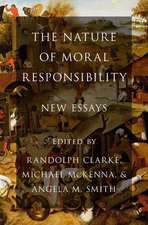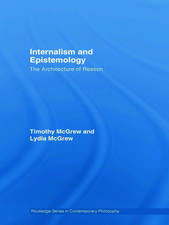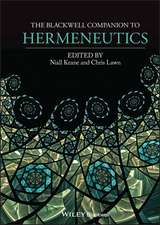Free Will: A Contemporary Introduction: Routledge Contemporary Introductions to Philosophy
Autor Michael McKenna, Derk Pereboomen Limba Engleză Hardback – 11 iul 2016
| Toate formatele și edițiile | Preț | Express |
|---|---|---|
| Paperback (1) | 296.58 lei 3-5 săpt. | +23.54 lei 10-14 zile |
| Taylor & Francis – 8 iul 2016 | 296.58 lei 3-5 săpt. | +23.54 lei 10-14 zile |
| Hardback (1) | 1007.39 lei 6-8 săpt. | |
| Taylor & Francis – 11 iul 2016 | 1007.39 lei 6-8 săpt. |
Din seria Routledge Contemporary Introductions to Philosophy
-
 Preț: 311.90 lei
Preț: 311.90 lei -
 Preț: 316.33 lei
Preț: 316.33 lei -
 Preț: 296.58 lei
Preț: 296.58 lei -
 Preț: 265.28 lei
Preț: 265.28 lei -
 Preț: 287.79 lei
Preț: 287.79 lei -
 Preț: 295.29 lei
Preț: 295.29 lei -
 Preț: 302.64 lei
Preț: 302.64 lei -
 Preț: 295.63 lei
Preț: 295.63 lei -
 Preț: 311.47 lei
Preț: 311.47 lei -
 Preț: 265.87 lei
Preț: 265.87 lei -
 Preț: 268.17 lei
Preț: 268.17 lei -
 Preț: 310.22 lei
Preț: 310.22 lei -
 Preț: 356.94 lei
Preț: 356.94 lei - 20%
 Preț: 239.80 lei
Preț: 239.80 lei -
 Preț: 342.06 lei
Preț: 342.06 lei -
 Preț: 286.87 lei
Preț: 286.87 lei -
 Preț: 281.18 lei
Preț: 281.18 lei -
 Preț: 372.91 lei
Preț: 372.91 lei -
 Preț: 280.28 lei
Preț: 280.28 lei -
 Preț: 334.58 lei
Preț: 334.58 lei -
 Preț: 293.52 lei
Preț: 293.52 lei -
 Preț: 280.92 lei
Preț: 280.92 lei - 9%
 Preț: 936.25 lei
Preț: 936.25 lei -
 Preț: 350.02 lei
Preț: 350.02 lei -
 Preț: 231.05 lei
Preț: 231.05 lei -
 Preț: 388.42 lei
Preț: 388.42 lei -
 Preț: 281.42 lei
Preț: 281.42 lei -
 Preț: 375.33 lei
Preț: 375.33 lei -
 Preț: 386.00 lei
Preț: 386.00 lei -
 Preț: 346.33 lei
Preț: 346.33 lei -
 Preț: 366.80 lei
Preț: 366.80 lei
Preț: 1007.39 lei
Preț vechi: 1228.53 lei
-18% Nou
Puncte Express: 1511
Preț estimativ în valută:
192.76€ • 201.80$ • 159.50£
192.76€ • 201.80$ • 159.50£
Carte tipărită la comandă
Livrare economică 05-19 aprilie
Preluare comenzi: 021 569.72.76
Specificații
ISBN-13: 9780415996860
ISBN-10: 0415996864
Pagini: 344
Dimensiuni: 156 x 234 x 21 mm
Greutate: 0.66 kg
Ediția:1Adnotată
Editura: Taylor & Francis
Colecția Routledge
Seria Routledge Contemporary Introductions to Philosophy
Locul publicării:Oxford, United Kingdom
ISBN-10: 0415996864
Pagini: 344
Dimensiuni: 156 x 234 x 21 mm
Greutate: 0.66 kg
Ediția:1Adnotată
Editura: Taylor & Francis
Colecția Routledge
Seria Routledge Contemporary Introductions to Philosophy
Locul publicării:Oxford, United Kingdom
Public țintă
Postgraduate and UndergraduateCuprins
Preface
Introduction
Chapter 1: Free Will, Moral Responsibility, & Determinism
Chapter 2: The Free Will Problem
Chapter 3: Classical Compatibilism & Classical Incompatibilism
Chapter 4: The Debate over the Consequence Argument
Chapter 5: Alternative Possibilities and Frankfurt Cases Chapter 6: Strawsonian Compatibilism
Chapter 7: Recent Developments: Source Incompatibilism & the Compatibilists’ Burden
Chapter 8: Contemporary Compatibilism: Seven Recent Views
Chapter 9: Contemporary Compatibilism: Mesh, Reasons-responsive & Leeway Theories
Chapter 10: Contemporary Incompatibilism: Libertarianism
Chapter 11: Contemporary Incompatibilism: Free Will Skepticism
Chapter 12: Revisionism and Some Remaining Issues
Bibliography
Introduction
Chapter 1: Free Will, Moral Responsibility, & Determinism
Chapter 2: The Free Will Problem
Chapter 3: Classical Compatibilism & Classical Incompatibilism
Chapter 4: The Debate over the Consequence Argument
Chapter 5: Alternative Possibilities and Frankfurt Cases Chapter 6: Strawsonian Compatibilism
Chapter 7: Recent Developments: Source Incompatibilism & the Compatibilists’ Burden
Chapter 8: Contemporary Compatibilism: Seven Recent Views
Chapter 9: Contemporary Compatibilism: Mesh, Reasons-responsive & Leeway Theories
Chapter 10: Contemporary Incompatibilism: Libertarianism
Chapter 11: Contemporary Incompatibilism: Free Will Skepticism
Chapter 12: Revisionism and Some Remaining Issues
Bibliography
Notă biografică
Michael McKenna is the Keith Lehrer Chair and Professor of Philosophy in the Department of Philosophy at the University of Arizona. He is the author of Conversation and Responsibility (2012) and numerous articles on the topics of free will and moral responsibility.
Derk Pereboom is Stanford H. Taylor ’50 Chair and Susan Linn Sage Professor in the Philosophy Department at Cornell University. He is the author of Living without Free Will (2001), Consciousness and the Prospects of Physicalism (2011), Free Will, Agency, and Meaning in Life (2014), and articles on free will and moral responsibility, philosophy of mind, and the history of modern philosophy.
Derk Pereboom is Stanford H. Taylor ’50 Chair and Susan Linn Sage Professor in the Philosophy Department at Cornell University. He is the author of Living without Free Will (2001), Consciousness and the Prospects of Physicalism (2011), Free Will, Agency, and Meaning in Life (2014), and articles on free will and moral responsibility, philosophy of mind, and the history of modern philosophy.
Recenzii
"A superb introduction to free will by a pair of leading figures on the topic. This excellent teaching tool for advanced undergraduates is at once commendably rigorous and highly accessible."
Alfred Mele, Florida State University, USA
"This terrific book excels on every dimension. It provides a map of the debates about free will, covering broad swaths of terrain without sacrificing attention to detail, and doing so in an engaging way that can be appreciated by interested newcomers to the field and those who have long been working and teaching in it alike."
Dana Nelkin, University of California-San Diego, USA
"For a definitive tour of the foundational issues in the philosophical debates about free will, you cannot do better than this book. It is a master class in what the issues are, how we got here, and the stakes of it all. Written by two of the most prominent and influential figures working in the field today, this book covers takes you through all the major issues of the last sixty years of philosophical work on free will. It is a model of clarity, impartial assessment of the options, and insight into the perplexing nature of free will. Whether you are a student, professional philosopher, scientist, or interested layperson, McKenna and Pereboom’s introduction to the philosophy of free will is the gold standard. It is fantastic."
Manuel Vargas, University of San Francisco, USA
"Free Will: A Contemporary Introduction is an extremely good book. It is a sorely needed introduction to the topic of free will that will be useful not just to those who want to teach free will but to any philosopher who wants to be brought up to date on the contemporary debate. It contains discussions of all of the leading views in the field, with lots of interesting and original insights into the various issues."
Mark Balaguer, California State University-Los Angeles, USA
"McKenna and Pereboom are celebrities among philosophers working on free will and moral responsibility and their book is a comprehensive, state-of-the-art introduction to contemporary philosophical debate. Their prose is clear and accessible, suitable for upper level undergraduates as well as professional philosophers. McKenna and Pereboom break down the arguments for all of the competing positions, highlighting their strengths and weaknesses and the ethical implications of accepting them. Read this book if you want to learn about where things stand today in this exciting field. What you do with that knowledge is up to you. (Or is it?)"
Tamler Sommers, University of Houston, USA
Alfred Mele, Florida State University, USA
"This terrific book excels on every dimension. It provides a map of the debates about free will, covering broad swaths of terrain without sacrificing attention to detail, and doing so in an engaging way that can be appreciated by interested newcomers to the field and those who have long been working and teaching in it alike."
Dana Nelkin, University of California-San Diego, USA
"For a definitive tour of the foundational issues in the philosophical debates about free will, you cannot do better than this book. It is a master class in what the issues are, how we got here, and the stakes of it all. Written by two of the most prominent and influential figures working in the field today, this book covers takes you through all the major issues of the last sixty years of philosophical work on free will. It is a model of clarity, impartial assessment of the options, and insight into the perplexing nature of free will. Whether you are a student, professional philosopher, scientist, or interested layperson, McKenna and Pereboom’s introduction to the philosophy of free will is the gold standard. It is fantastic."
Manuel Vargas, University of San Francisco, USA
"Free Will: A Contemporary Introduction is an extremely good book. It is a sorely needed introduction to the topic of free will that will be useful not just to those who want to teach free will but to any philosopher who wants to be brought up to date on the contemporary debate. It contains discussions of all of the leading views in the field, with lots of interesting and original insights into the various issues."
Mark Balaguer, California State University-Los Angeles, USA
"McKenna and Pereboom are celebrities among philosophers working on free will and moral responsibility and their book is a comprehensive, state-of-the-art introduction to contemporary philosophical debate. Their prose is clear and accessible, suitable for upper level undergraduates as well as professional philosophers. McKenna and Pereboom break down the arguments for all of the competing positions, highlighting their strengths and weaknesses and the ethical implications of accepting them. Read this book if you want to learn about where things stand today in this exciting field. What you do with that knowledge is up to you. (Or is it?)"
Tamler Sommers, University of Houston, USA
Descriere
As an advanced introduction to the challenging topic of free will, this book is designed for upper-level undergraduates interested in a comprehensive first-stop into the field’s issues and debates. It is written by two of the leading participants in those debates—a compatibilist on the issue of free will and determinism (Michael McKenna) and an incompatibilist (Derk Pereboom). These two authors achieve an admirable objectivity and clarity while still illuminating the field’s complexity and key advances. Each chapter is structured to work as one week’s primary reading in a course on free will, while more advanced courses can dip into the annotated further readings, suggested at the end of each chapter. A comprehensive bibliography as well as detailed subject and author indexes are included at the back of the book.




























